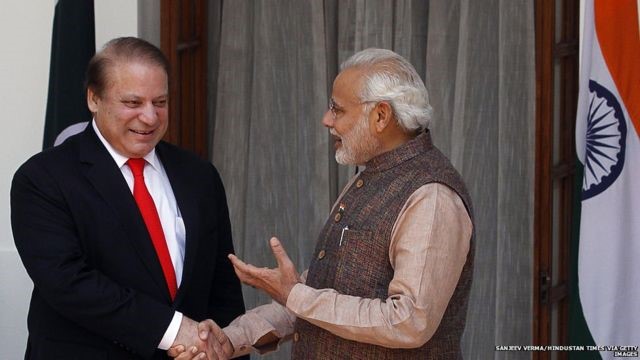India-Pakistan ceasefire: Will the agreement last long?
On Thursday, India and Pakistan announced a ceasefire along the Line of Control (LoC). The ceasefire has been announced after talks between the Directors General of Military Operations (DGMO) of the armies of the two countries.
Under this, from midnight of 24-25 February, both the countries will stop firing on the Line of Control and will follow the previous agreements for ceasefire.
A joint statement issued by the Ministry of Defense on February 25 stated, “The Director General of Military Operations of India and Pakistan discussed through the hotline. Both sides open and amicable atmosphere of the current situation on the Line of Control and all other sectors.” Reviewed in. “
It further states, “In view of mutual interests and to maintain peace on the border, the two DGMOs will negotiate on serious issues related to each other, which threatens the breach of peace or escalating violence in the area.”
This statement also said that both sides also agreed to strictly abide by all agreements and a ceasefire on the LoC and all other sectors.
Will the relationship between Pakistan and Sri Lanka be a challenge for India?
America and the United Nations said good decision
The United States and the United Nations have expressed happiness over the ceasefire between India and Pakistan. Volcan Bozkir, President of the United Nations General Assembly, has welcomed the ceasefire between the two countries and said that the commitment of both countries to resolve core issues and maintain peace is an example for other countries as well.
America has also welcomed this step. The US has described it as a positive step for peace and stability in South Asia.
The agreement hopes to open the way for negotiation
Retired Lieutenant General Vinod Bhatia considers the ceasefire as a positive step. Says Bhatia, “The ceasefire of 2003 has been refreshed. This will help improve relations between India and Pakistan.”
“With this, there has also been talk of CBM (Confidence Building Measures or measures to increase confidence) between the two countries, such as hotline and flag meetings. All this was halted due to the firing,” he says.
Bhatia believes that Pakistan needed it more because it is still in the gray list of the FATF. Also, India will also benefit from this.

Will the relationship between Pakistan and Sri Lanka be a challenge for India?
Senior journalist Ghazala Wahab says that this is a positive step. She says, “It is not possible for any country to be constantly under stress. In times of tension everything including bilateral agreements, business is affected. It is a good start from this point and hopefully the situation will be further Will improve. “
There has been a ceasefire between the two countries in the past as well and it was sustained for a long time. After 2003, there has been peace on the borders for a long time.
Wahab says, “During that time people used to go across the LoC and do farming. In such a situation, if both countries follow this agreement, then the doors of negotiation will also be opened in future.”
Saikat Dutta, a strategic affairs expert and senior journalist, says, “There has been tension with China since last year. In such a situation, the government did not want China and Pakistan to have tension with both the borders.”
They say that this agreement is fine in this regard.
Saikat Dutta says that incidents of ceasefire violations have increased since 2014. At the same time, the number of extremist incidents and casualties have also increased.
Dutta admits that there were not many incidents of ceasefire violations from 2003 to 2014 and this phase was almost silent.
Shooting incidents have increased in the last few years
There was a ceasefire between India and Pakistan in the year 2003. However, after lasting for a few years, it became just a nominal agreement and there are frequent incidents of cross border firing and ceasefire violations between the two countries.
According to government data, there has been an increase in incidents of ceasefire violations between India and Pakistan in 2020.
There were 5,133 ceasefire violations in 2020 along the border with Jammu and Kashmir, which is 47.5 per cent higher than the 3,479 ceasefire violations in 2019.
In 2020, there have been 46 deaths due to these incidents. These include 22 ordinary civilians and 24 security forces. So far this year, there have been close to 300 ceasefire violations.
In 2018, there were 2,936 ceasefire violations in Jammu and Kashmir and 61 security forces and civilians were killed. The number of these incidents in 2017 was 971. During this 12 civilians and 19 security forces were killed.
In this way, the data shows that there has been an increase in the ceasefire violations between India and Pakistan in the last few years.
Will the agreement be sustainable?
Given the chronic history of disputes between the two countries, the bad experiences of extremism, infiltration and ceasefire violations, the question arises that how long will this ceasefire last?
Lt Gen Vinod Bhatia says, “Actually Pakistan infiltrates under the cover of firing. If they stop the infiltration then further negotiations can begin.”
Ghazala Wahab says, “The biggest challenge is for both countries to stick to this ceasefire. Political opportunism should not be used on this issue.”
Bhatia, while referring to the repeated breakdown of the ceasefire, fears that further negotiations will depend on how to implement it.
They say that this ceasefire has not happened for the first time. A ceasefire agreement was signed for the first time in 2003 and it lasted only for 4-5 years. In 2007, there were incidents of firing.
Says Bhatia, “In 2013, I went to the Wagah border as DGMO and talked to the DGMO of Pakistan. After that the ceasefire continued. It broke again. In 2018 again the ceasefire was negotiated and it broke again. This time Must also see how long it lasts. “
Says Bhatia, “The ceasefire will last only when Pakistan curbs infiltration. Even if the ceasefire persists even for 3-4 years, it will be a big deal.”
However, they cast doubt on the intention of Pakistan. He says, “Pakistan has a policy of proxy war. In such a situation, I don’t think they will stop the intrusion.”
Domestic politics is a factor
Pakistan being an important issue in India’s domestic politics can also be a big factor.
Saikat Dutta says, “There are two big challenges in the path of ceasefire to be sustainable. First is that we cannot trust Pakistan. Second, the domestic policy of the current government seems to mix foreign policy. Domestic politics I have been using the issue of Pakistan. In such a situation, it cannot be said how long this ceasefire will last. “
Ghazala Wahab says that if we want peace then using Pakistan as a political issue should also stop. It should be from both the sides.
Will the original issues matter?
In a joint statement, the two sides have talked about resolving the basic issues, but there is confusion about this as well.
Wahab says, “This is an interesting thing because our core issues and their issues are different. We consider extremism to be the main issue. Their main issue is Kashmir. In such a situation, if there is a matter then both of our issues will be discussed. The government has said that we will not talk on the issue of Kashmir because it is our internal issue. A dispute may also arise on this. “
On the issue of restoring peace through resolving the core issues of both the countries, Lt Gen Vinod Bhatia says, “The agreement on the ceasefire is the first step. The issues that have been going on for the last seventy years cannot be resolved in a day. However, further on this How this will be extended will depend on how this ceasefire is implemented. “
Government’s aim is not clear
Experts believe that till now it is not clear for what purpose the government has ceased a ceasefire, because the policy of the government for the last several years has been that there is no need to negotiate with Pakistan.
Wahab says, “It is not yet clear what the government’s motive is. Has it been done to achieve any short-term goal? Has this happened in view of China’s tensions? Or indeed the government has to It seems that relations with Pakistan should be improved. “
Wahab hopes that in future there will be more clarity about this.




